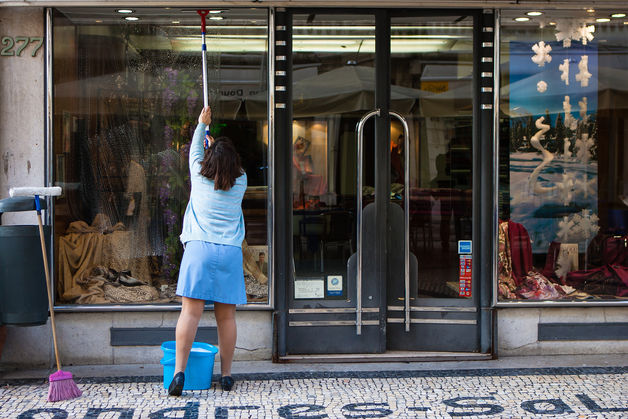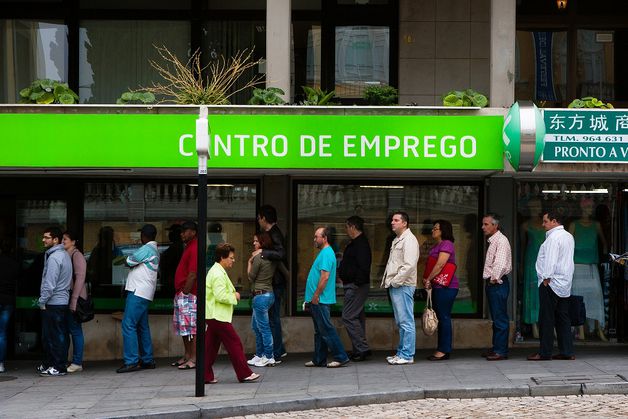
Europe to build planet-hunting space telescope
February 20, 2014Victoria Justice’s Colorful Watercolor…
February 20, 2014It took 11 months and the sale of his 2008 Ford Focus to pay the bills before Nuno Silva found a job as a supervisor at a food warehouse in southern Portugal.
The pay isn’t great — about 15,000 euros ($20,600) a year — and sub-zero inside temperatures turn his workplace in one of Europe’s sunniest spots into an igloo.
“Some of my friends who also lost their jobs are finding work,” the 35-year-old Silva said Feb. 13, opening day at the distribution center operated by Jeronimo Martins SGPS SA, Portugal’s biggest food retailer. “Things seem to be improving in terms of jobs in Portugal.”
That diagnosis applies to Europe as well. While the 18-nation euro economy is still generating less output and providing work for fewer people than before the financial crisis started in 2008, it has also stopped incubating the toxic mix of debt and political irresolution that brought history’s most ambitious monetary experiment close to breaking point.
The recovery initially reflected by financial markets is trickling down from Germany. The overall euro economy grew 0.3 percent in the final three months of 2013, expanding for the third consecutive quarter.
“The euro area is beginning to show signs of recovery,” Organization for Economic Cooperation and Development Secretary-General Angel Gurria said Feb. 17 in Brussels. While financial tensions have abated and debt levels are stabilizing, “growth is still weak and very uneven,” he added.

An employee washes the display window of a store in Lisbon.
An employee washes the display window of a store in Lisbon. Close
Open
Photographer: Mario Proenca/Bloomberg
An employee washes the display window of a store in Lisbon.
Then and Now
While Europe lags behind the U.S. in growth and job creation, a then-and-now comparison is telling. In September 2011, with Greece, Ireland and Portugal on life support, and Spain and Italy wobbling, Timothy F. Geithner, then U.S. treasury secretary, called the euro area the “most serious risk now confronting the world economy.”
At that point, many investors, including Mohamed El-Erian, then chief executive officer of Pacific Investment Management Co., wondered how long the euro would last. Portugal’s bonds were such a risky proposition that to hold them, buyers demanded yields that were 10 percentage points higher than German bonds. That spread now is little more than 3 percentage points and Portugal is preparing to become the third country, after Ireland and Spain, to exit its aid program.
Such a turnaround in sentiment has also buoyed the euro, which rose to $1.3770 yesterday, little more than a cent away from the two-year high reached in December.

Jobseekers queue to enter an employment center in Sintra, Portugal.
Jobseekers queue to enter an employment center in Sintra, Portugal. Close
Open
Photographer: Mario Proenca/Bloomberg
Jobseekers queue to enter an employment center in Sintra, Portugal.
Safe Haven
The euro “trades increasingly like a safe-haven currency,” Peter Kinsella, a senior currency strategist at Commerzbank AG in London, said in an interview yesterday on Bloomberg Radio’s “The First Word” with Bob Moon. “If the euro remains robust, I don’t see it falling off the wagon the way we did two or three years ago.”
Throughout 2013, the recovery flickered across stock and bond traders’ screens. The Stoxx Europe 600 Index gained 17 percent, the best performance since 2009. Investors who ventured back into the bond market in Greece, where the euro crisis started in 2010, racked up 37 percent returns after a gain of almost 100 percent the year before, according to data compiled by Bloomberg and the European Federation of Financial Analysts Societies.
That enthusiasm was slow to seep into the economy, which shrank 0.4 percent in 2013. Not that there weren’t bright spots: home prices in Ireland rose for the first time in six years, Greece started paying its own way by posting an operating budget surplus, and Spain earned more from exports than it spent on imports for the first time in at least two decades.
Car Sales
Carmakers may be a barometer of better times ahead, after showing a sales increase in Europe for the fifth consecutive month in January. Renault SA, based in the Paris suburb of Boulogne-Billancourt, reported a 59 percent jump in 2013 operating profit. Stuttgart, Germany-based Daimler AG said fourth-quarter profit surged 45 percent and earnings will rise “significantly” this year. Demand is resilient enough that Toyota City, Japan-based Toyota Motor Corp., the world’s largest automaker, is adding a third shift at a French factory that produces its Yaris model.
“Don’t count France out,” Chris Viehbacher, chief executive officer of Sanofi, France’s largest drugmaker, told Bloomberg Television on Feb. 10. Sanofi forecast its first increase in annual profit in four years.
The corporate rebound is barely connecting with the 19.1 million people out of work in the euro zone, up from 11.4 million when the global financial tumult started in 2008. The stakes are as much political as economic: anti-euro parties that feed on unemployment and resentment are poised for gains in European Parliament elections in May, making the job of running Europe even harder.
Crisis Over
“The crisis of the euro zone is over, no existential doubt about the euro,” French Finance Minister Pierre Moscovici told Bloomberg Television in Washington on Feb. 12. “There is a crisis in the euro zone, but it’s of another nature: how can we speed up our growth.”
Jose Rodriguez knows all about that dilemma. After the shipping company he worked at went bankrupt two years ago, the Madrid resident took English courses, got a license to operate warehouse machinery, scoured the help-wanted ads and collected an unemployment check.
Now, Rodriguez is on a nine-month contract as a forklift driver, earning 900 euros a month. The pay is less than the 1,200 euros of his previous job, the daily commute is 60 kilometers (37 miles), and there’s no guarantee that the job will be there when he arrives: a fellow employee was laid off last week.
Saving Money
“I’m still spending as little as possible, saving as much as I can,” Rodriguez, 37, says.
Savers outnumber spenders in southern Europe especially, thanks to the combination of public and private debt, budget cuts, economic contraction and unemployment. The split-screen nature of the European economy — with the jobless rate as low as 4.9 percent in Austria and as high as 28 percent in Greece — complicates the task of setting a single economic policy for the euro zone’s 333 million people.
Steering Europe “as a whole” is the mission of the European Central Bank. It has 15 years of experience trying to set a common interest rate for divergent economies, with mixed results. Rates that peaked at 4.75 percent in the euro’s early years were too high for Germany and too low elsewhere, fueling the borrowing binge in the peripheral economies.
Draghi’s Options
With the main rate now at 0.25 percent and unable to go much lower, the ECB — in the footsteps of the U.S. Federal Reserve and Bank of Japan — is casting about for unorthodox ways of keeping the recovery alive. ECB President Mario Draghi has signaled that a further easing of monetary policy may be on the agenda at the bank’s next policy meeting on March 6.
One warning sign is that inflation slowed to 0.7 percent in January, moving away from the ECB’s 2 percent target and stirring concern that stagnant or falling prices may mire the economy. Barclays Plc and Morgan Stanley are among those warning of the risk of Japan-style deflation.
The green shoots of revival didn’t add up to a green thumb for Marco Antoci D’Agostino, an Italian systems engineer. In mid-crisis, D’Agostino took the risk of quitting a job at Spirax-Sarco Engineering Plc’s office in Milan to pursue his goal of becoming a landscape architect.
D’Agostino, 37, took a six-month gardening course and went into business, only to discover that when it comes to planting flowers and trees and mowing lawns, economically strapped Italians aren’t prepared to pay top dollar.
“Most customers favor low-cost services provided by people who aren’t pros,” D’Agostino says. His foray between employment, unemployment and self-employment ended on a happy note. D’Agostino is back in the industrial software business, working for Trasmetal SpA, a Milan-based maker of painting and enameling systems.
To contact the reporter on this story: James G. Neuger in Brussels at jneuger@bloomberg.net
To contact the editor responsible for this story: James Hertling at jhertling@bloomberg.net

